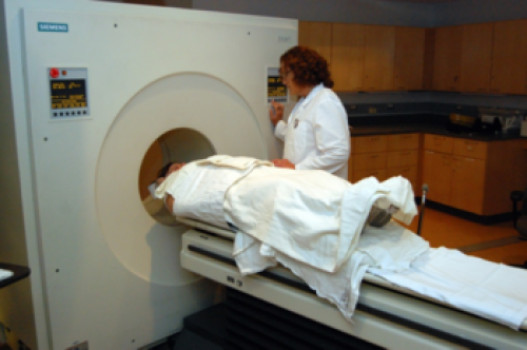
The link between a protein typically associated with Alzheimer’s disease and its impact on memory and cognition may not be as clear as once thought, according to a new study from the University of Wisconsin-Madison’s Waisman Center. The findings are revealing more information about the earliest stages of the neurodegenerative disease.
The researchers — including lead study author Sigan Hartley, UW-Madison assistant professor of human development and family studies, and Brad Christian, UW-Madison associate professor of medical physics and psychiatry and director of PET Physics in the Waisman Laboratory for Brain Imaging and Behavior — looked at the role of the brain protein amyloid-β in adults living with Down syndrome, a genetic condition that leaves people more susceptible to developing Alzheimer’s. They published their findings in the September issue of the journal Brain.
“Our hope is to better understand the role of this protein in memory and cognitive function,” says Hartley. “With this information we hope to better understand the earliest stages in the development of this disease and gain information to guide prevention and treatment efforts.”
However, the findings of their study not only may help scientists better understand the condition as it impacts those living with Down syndrome, but they are also relevant to adults without the genetic syndrome.
“There are many unanswered questions about at what point amyloid-β, together with other brain changes, begins to take a toll on memory and cognition and why certain individuals may be more resistant than others,” says Hartley.
The UW-Madison scientists, along with collaborators at the University of Pittsburgh, studied 63 healthy adults with Down syndrome, aged 30 to 53, who did not exhibit clinical signs of Alzheimer’s or other forms of dementia. They found that many adults with Down syndrome had high levels of amyloid-β protein but did not suffer the expected negative consequences of the elevated protein.
Alzheimer’s disease is the sixth leading cause of death in the U.S. People with Down syndrome are born with an extra copy of the 21st chromosome, where the gene that codes for the amyloid-β protein resides.
For the study, which was conducted over the course of two days, researchers used magnetic resonance imaging (MRI) and positron emission tomography (PET) scans to capture images of the participants’ brains. Twenty-two of the 63 participants had elevated levels of amyloid-β but showed no evidence of diminished memory or cognitive function when compared to those without elevated levels of the protein. The researchers controlled for differences in age and intellectual level.
Similarly, when assessed as a continuous measure, amyloid-β levels were not tied to differences in memory or cognitive ability, such as changes in visual and verbal memory, attention and language.
Hartley and Christian also partnered with Marsha Mailick, interim vice chancellor for research and graduate education and Vaughan Bascom and Elizabeth M. Boggs Professor, and UW Alzheimer’s Disease Research Center (ADRC) investigators on the study. With funding from the National Institute of Aging, the researchers plan to follow these 63 adults for the next several years, to continue to track the accumulation of amyloid-β and its effects over time.
Story Source:
The above story is based on materials provided by University of Wisconsin-Madison. The original article was written by Marlena Holden. Note: Materials may be edited for content and length.
Journal Reference:
- S. L. Hartley, B. L. Handen, D. A. Devenny, R. Hardison, I. Mihaila, J. C. Price, A. D. Cohen, W. E. Klunk, M. R. Mailick, S. C. Johnson, B. T. Christian. Cognitive functioning in relation to brain amyloid- in healthy adults with Down syndrome. Brain, 2014; 137 (9): 2556 DOI: 10.1093/brain/awu173
